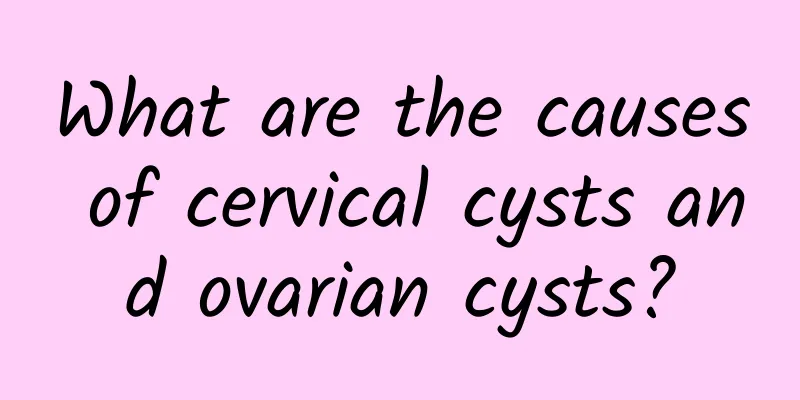What are the causes of cervical cysts and ovarian cysts?

|
The occurrence of cervical cysts and ovarian cysts is usually related to multiple factors such as genetics, environmental factors, physiological abnormalities, and pathological inflammation. Targeted prevention and treatment measures should be taken according to the specific causes. The following is a detailed analysis of the causes from the aspects of genetics, external environment, own physiology and pathology. 1. Genetic factors Both cervical cysts and ovarian cysts may be related to genetics. If there is a similar cyst disease in a direct relative, the probability of related problems in the offspring will increase. Family inheritance may cause abnormal fluctuations in an individual's hormone levels, thereby stimulating the formation of cysts. 2 Environmental factors Being in a bad external environment for a long time may increase the risk of cysts. For example, contact with daily necessities containing hormones or chemicals can interfere with endocrine. Bad lifestyle behaviors, such as sitting for a long time, smoking, drinking, etc., can also reduce metabolic levels and induce cyst formation. 3 Physiological factors Cervical cysts are usually caused by the blockage of the cervical gland opening, which leads to the accumulation of glandular secretions; while ovarian cysts are related to abnormal follicular development, such as failure of follicles to be discharged or abnormal corpus luteum degeneration. Physiological problems such as endocrine disorders and irregular menstrual cycles are common triggers. 4 Pathological inflammation or disease Long-term gynecological inflammation can destroy the normal structure of tissues and promote the formation of cysts. For example, vaginitis, cervicitis and pelvic inflammatory disease may lead to cervical cysts. In addition, diseases such as polycystic ovary syndrome and ovarian dysfunction are also closely related to the formation of ovarian cysts. Prevention, control and treatment recommendations 1. Regular inspection A gynecological examination once a year, especially an ultrasound examination, can detect cyst problems early. If problems are found, seek medical evaluation in time to avoid disease progression. 2. Maintain a healthy lifestyle Maintain a balanced diet and consume more fiber-rich fruits and vegetables, such as spinach and carrots; stay away from sources of hormone pollution, reduce staying up late, and exercise moderately to stabilize your endocrine system. 3. Medication or surgery For mild cervical cysts or ovarian cysts, you can take medication as prescribed by your doctor, such as hormone regulating drugs to regulate endocrine. If the cyst is large or has the potential to become malignant, surgical removal can be chosen. Common methods include hysteroscopy, laparoscopy or laparotomy. The formation of cervical cysts and ovarian cysts is often the result of multiple factors. Early detection and targeted treatment are the key. If you have any discomfort, it is recommended to go to the hospital's gynecology department as soon as possible to consult a professional doctor for evaluation and treatment to ensure your health and quality of life. |
<<: What tests should be done to prepare for pregnancy after missed abortion
>>: Do I need to hold my urine when doing ultrasound for threatened abortion?
Recommend
Symptoms of uterine fibroids
Uterine fibroids are a very common gynecological ...
What are the abnormal symptoms of menstruation before menopause?
Premenopause can cause symptoms such as irregular...
Can Bartholinitis be cured?
Feeling itchy and damp in the vulva directly and ...
The best and fastest treatment for chronic pelvic inflammatory disease
What is the best and fastest treatment for chroni...
Is embolization effective for treating adenomyosis?
The effect of embolization treatment for adenomyo...
My period just ended but I still feel pain in my stomach. What's wrong?
My period just ended but I still feel tingling in...
Is the spontaneous abortion test strip still a double bar? Don't trust it too much
Some female friends may have doubts about whether...
Get rich without getting stuck in oil! Eat Five Elements High Fiber Yuanbao in the Year of the Horse
Whether it is purchased New Year's dishes or ...
How do menopausal patients take care of themselves?
Women in menopause will face many problems, which...
How long does it take for severe cervicitis to turn into cancer?
How long does it take for severe cervicitis to tu...
Are you still using sugar substitutes to lose weight?
The most irresistible thing when losing weight is...
Common types of pelvic effusion
After the physical examination, it was discovered...
Women can judge pelvic peritonitis by leucorrhea
Pelvic peritonitis is very common for many women....
Men's crisis doctor: testosterone reduction can lead to osteoporosis
Testosterone is very important for bone density. ...
What medicine should I take if I have small uterine fibroids? What medicine should I take to treat small uterine fibroids?
What medicine should I take if I have small uteri...









